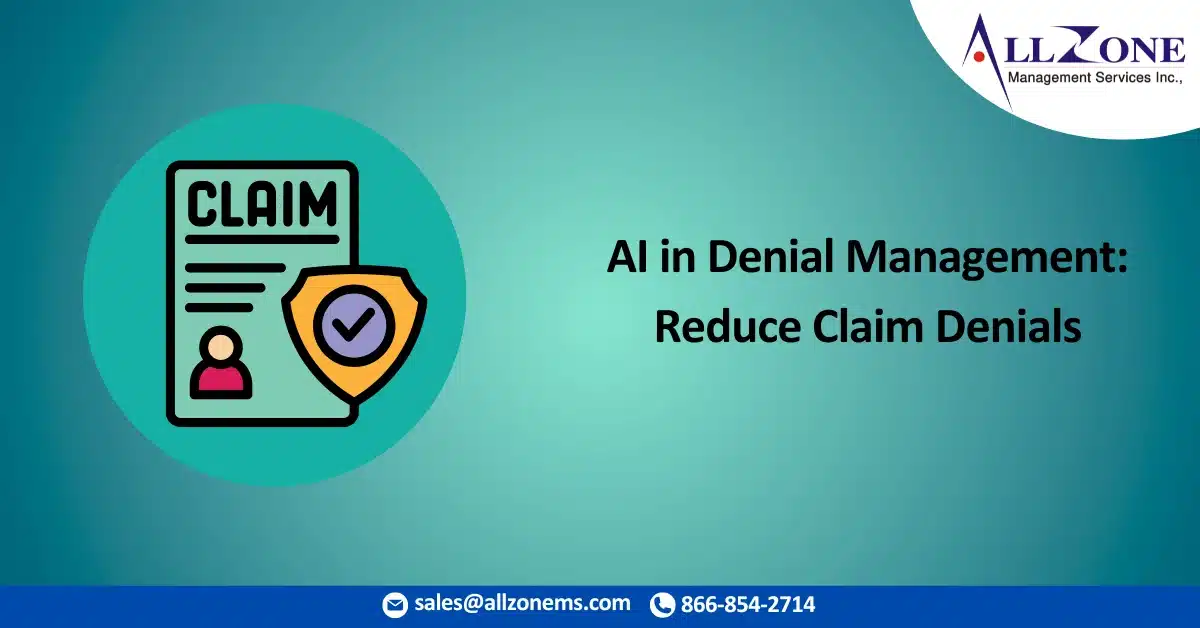Artificial intelligence (AI) is one of the most talked-about innovations in healthcare finance—and for good reason. While it brings excitement about streamlined operations, particularly in areas like AI in denial management, and better outcomes, it also sparks questions about its impact on providers, staff, and daily workflows.
At AAPC, we’ve been actively exploring how AI can improve the healthcare revenue cycle—especially when it comes to tackling payer denials. By applying AI tools strategically, organizations can minimize revenue loss, boost cash flow, and dramatically improve operational efficiency. For healthcare providers seeking to optimize their revenue cycle, understanding how AI integrates into denial management services is crucial.
How AI Is Changing the Game in Denials Management:
The integration of AI is transforming how healthcare organizations approach denials, moving from reactive processes to proactive and intelligent solutions. This is where companies specializing in AI in denial management and related services are increasingly leveraging AI to offer enhanced value.
Predictive Denial Analytics:
AI can analyze large datasets quickly and accurately, offering insights that traditional methods miss:
- Identify high-risk claims: Predict which claims are likely to be denied—before they’re submitted. This capability is a significant advantage offered by sophisticated denial management services.
- Root cause analysis: Detect common denial triggers such as coding errors, missing documentation, or eligibility issues, and suggest corrective actions. This in-depth analysis is a hallmark of a robust denial management company.
- Claim risk scoring: Assign a risk score to each claim using data on payer behavior, coding patterns, and past denials. Solutions like Allzone MS can integrate such predictive analytics for improved outcomes.
Automated Claim Scrubbing & Pre-Submission Validation:
AI reduces human error and increases claim accuracy:
- AI-powered rules engine: Validate claims against payer rules, medical necessity, and coding guidelines before submission. This proactive approach is essential for effective denial management services.
- Real-time documentation review: Use Natural Language Processing (NLP) to ensure documentation supports coded procedures and diagnoses. Leading denial management companies are incorporating NLP for enhanced accuracy.
- Instant eligibility checks: AI bots can confirm patient coverage, limits, and authorization needs in real-time. This feature, often part of comprehensive denial management services, minimizes eligibility-related denials.
AI-Driven Denial Triage & Workflow Automation:
Streamline your denials workflow to save time and improve resolution rates:
- Categorize and route denials: AI can automatically sort denials by issue type and direct them to the right team. This intelligent routing is a key component of efficient denial management company operations.
- Smart worklists: Prioritize denials based on urgency, dollar amount, and appeal success potential. Solutions like Allzone MS can offer smart worklists for optimized resource allocation.
- Automated task assignment: RCM tools powered by AI can distribute work based on employee expertise and workload. This automation enhances the efficiency of any denial management company.
AI-Powered Appeals & Resolution:
Enhance your appeals process with data-driven automation:
- Auto-generate appeal letters: Tailor appeal content using payer-specific rules, medical necessity logic, and successful past templates. This automation significantly streamlines the appeal process for denial management services.
- Payer-specific strategies: Learn which appeal methods work best for each payer based on historical trends. A sophisticated denial management company utilizes such insights for higher appeal success rates.
- Chatbots for follow-up: AI bots can check claim status, interact with payer portals, and escalate unresolved denials. These AI-powered interactions are becoming increasingly common in modern denial management services.
Continuous Learning & Proactive Insights:
AI doesn’t just react—it learns and evolves:
- Real-time denial dashboards: Track trends by payer, provider, procedure, and location. Platforms like Allzone MS often provide such comprehensive dashboards.
- Process improvement suggestions: Predictive models recommend adjustments like documentation tweaks or charge capture updates. This proactive guidance is a valuable aspect of partnering with a strong denial management company.
- Compliance monitoring: Stay current with evolving payer policies and regulatory changes to avoid non-compliance denials. Staying compliant is a core function supported by effective denial management services.
Patient-Facing AI: Chatbots & Virtual Assistants
Improve patient satisfaction while reducing your team’s workload:
- Automated outreach: AI chatbots can send updates about denials, balances, and payment options.
- Self-service tools: Patients can check claim status, appeal a denial, or manage disputes directly through AI-integrated portals.
The ROI of AI in Denials Management
The numbers speak for themselves:
- 83% of organizations reported at least a 10% drop in claim denials within six months of implementing AI automation.
- 11% of all claims were denied in 2023, up from 8% in 2021—costing the average health system around 110,000 unpaid claims annually (American Medical Association).
- Providers spent nearly $20 billion in 2023 managing denials.
- AI significantly reduces administrative burden, freeing up staff time and reducing overhead.
In conclusion, AI in denial management is revolutionizing denial management services, offering unprecedented opportunities for healthcare organizations to improve their financial health. Whether through in-house implementation or by partnering with a specialized denial management company like one that might utilize platforms such as Allzone MS, embracing AI in denial management is no longer a futuristic concept but a present-day necessity for navigating the complexities of payer denials.

